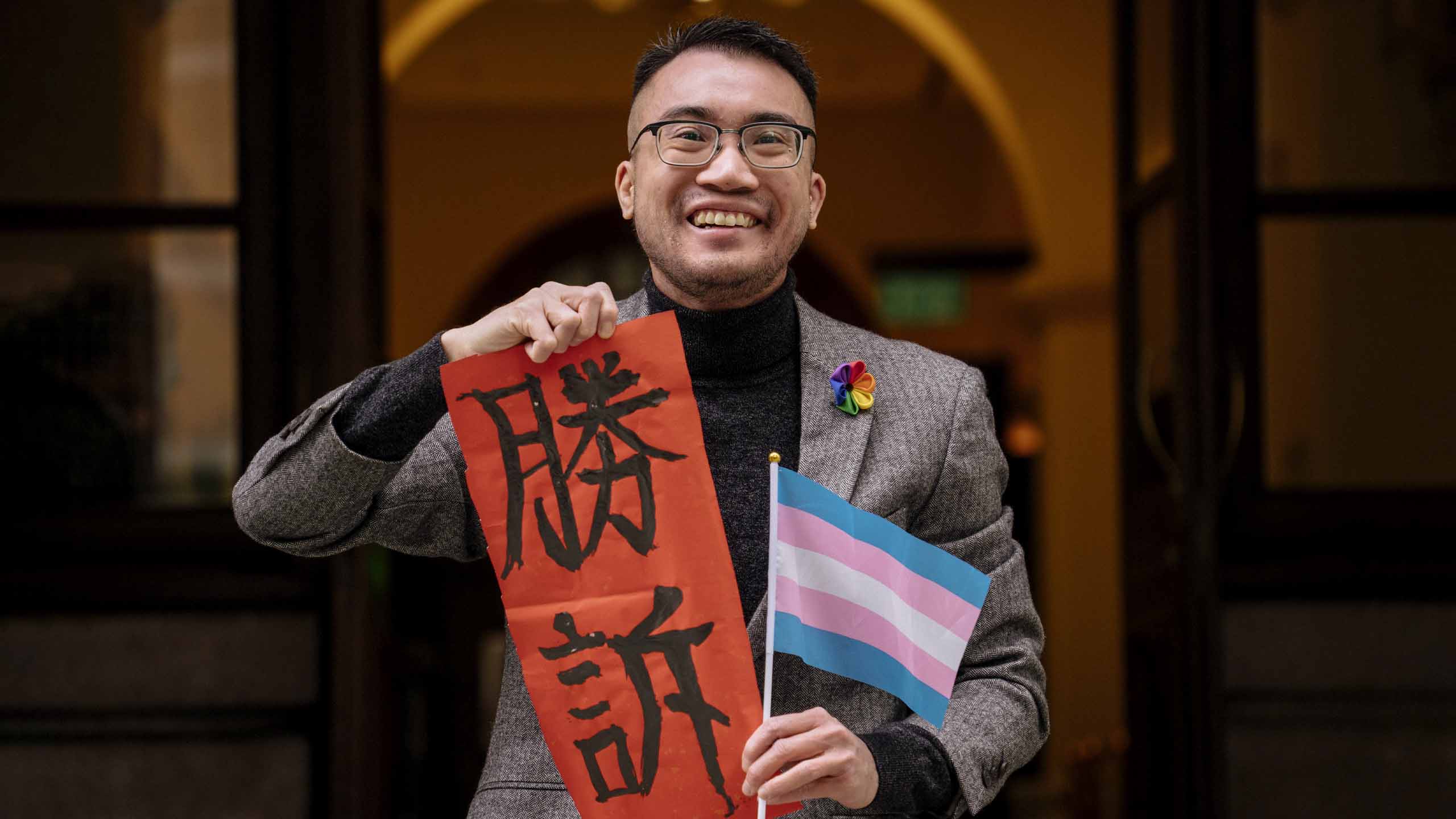After a long-fought legal battle, trans activists have proved in Hong Kong’s top court that the requirement to undergo full gender reassignment surgery in order to change gender markers on ID cards is unconstitutional.
The case was initially brought to the High Court in 2018 by trans activists Henry Tse, co-founder of Transgender Equality Hong Kong; and two other unnamed trans men identified as “Q” and “R.” The men were prohibited from changing their gender marker on IDs unless they could prove they had undergone full sex reassignment surgery (SRS), which under Hong Kong’s law requires the removal of uterus and ovaries, and the construction of “some form of a penis” for transmasculine individuals. Having already medically transitioned with other surgeries and hormone replacement therapy (HRT), they argued that further surgery was “unnecessary, unwanted and highly invasive.”
Heard at the Court of Final Appeal, Hong Kong’s highest court, judges unanimously voted in favour of the appellants’ case, rendering the Commissioner of Registration’s decision to deny gender marker changes without extensive surgery a violation of citizens’ rights.
“We are outed every time we present our ID,” Tse told Agence France-Presse (AFP) before the ruling, highlighting safety concerns with the standing requirements. Explaining that the surgeries needed in order to change gender markers on IDs are extremely expensive and invasive, Tse argued that the government’s demands “effectively coerced” trans people into potentially difficult medical procedures. He noted that unless trans citizens took that risk, they were “prohibited from full participation in life.”
The Hong Kong government had previously kept the policy in place with the claim that the requirements help counter “practical issues” with things like bathroom access and social services. Last year, the Court of Appeal doubled down on the requirements, ruling that they were “not satisfied that any treatment prior to a full SRS, though significantly less intrusive, is equally effective as a criterion in achieving the legitimate aim of the policy.”
But Monday’s ruling, which was heard by different judges than were present at last year’s Court of Appeal hearing, saw justices describe the policy as imposing an “unacceptably harsh burden on the individuals concerned,” ultimately “infringing on their right to bodily integrity.”
The panel of five judges stated in the written verdict that a full SRS procedure is “at the invasive end of the treatment spectrum for gender dysphoria” and is “not medically required by many transgender persons.”
They ruled that the current policy violates constitutional rights to privacy, as laid out in the Hong Kong Bill of Rights Ordinance.
The “external congruence” between trans citizens’ physical appearance and the gender marker on identity cards can lead to questioning from government officials that results in a “violation of dignity and invasion of privacy complained of in this appeal,” the judges wrote.
Tse held up a red banner known as a fai chun with the characters “successful appeal” alongside a trans flag outside the Court of Final Appeal after the verdict. He said that he would “rush to change his identity card” and that he was looking forward to having easier access to gyms and gendered bathrooms.
“Simple things like going to public bathrooms is impossible for me because I can’t go to the male bathroom, and it would be considered a crime of loitering if I use the female bathroom. So now … it will be a lot easier for me to access gender-segregated spaces,” he said, speaking to press outside of the court on Monday.
The hearing was Tse and Q’s last shot at seeking justice, having already seen their case go through the High Court and the Court of Appeal. The Court of Final Appeal is the last opportunity for legal challenges to be heard before all other avenues are exhausted. This makes it a particularly important feat for the appellants, who have not given up hope since initially filing their case over five years ago.
Tse expressed relief at his legal challenges finally being heard, telling reporters after the hearing that he had “defeated the wicked” and “successfully defended [his] dignity and male identity.”
For many, the verdict is a step in the right direction after many years of discriminatory policies and anti-LGBTQ+ attitudes in Hong Kong.
Liam Mak, who cofounded Quarks, a peer support group for trans youth in Hong Kong, told the Associated Press the win was “an important milestone” for trans rights.
“We believe that the gender identity of oneself should not be tied to medical intervention, we should ensure minimal to no medical intervention in the policy,” said Mak. “Given that every individual has different preferences or decisions in their own gender transition journey, I hope that the government will be referencing the advice from the court to protect the right of all transgender people.”
The case is one of many that could set precedents for pertinent LGBTQ+ issues in Hong Kong in the coming months. Later in February, judgments are expected for cases fighting for equal access to government-subsidized public housing, as well as cases arguing in favour of the right to self-determine which public toilet to use.
Tse described his multi-year legal battle as “delayed justice.”
“The five-year-long marathon for trans justice has finally come to an end,” he stated after the verdict. “This very case should never have happened.”
Though Tse acknowledged that there is a long way to go with regards to LGBTQ+ rights, he hopes his case will be a driving force in future campaigns for trans rights in Hong Kong.
“I will continue to work hard to plant the seeds for the transgender rights movements with my partners at Transgender Equality Hong Kong,” he said. “I believe that one day, we shall succeed and welcome the rainbow with open arms.”


 Why you can trust Xtra
Why you can trust Xtra


